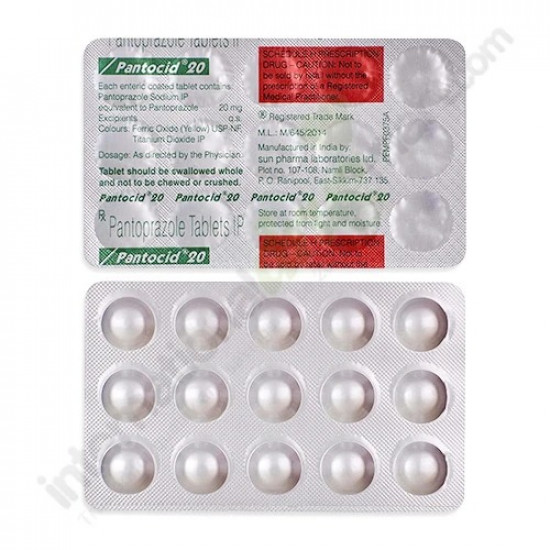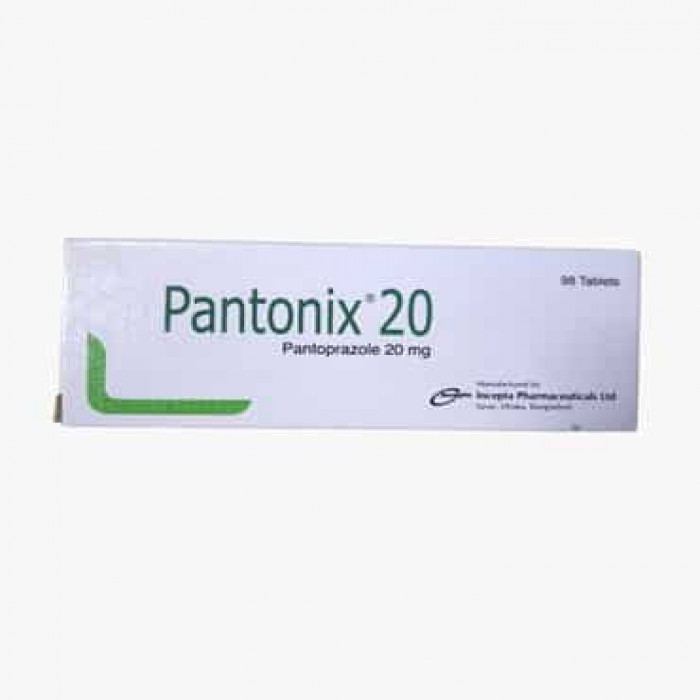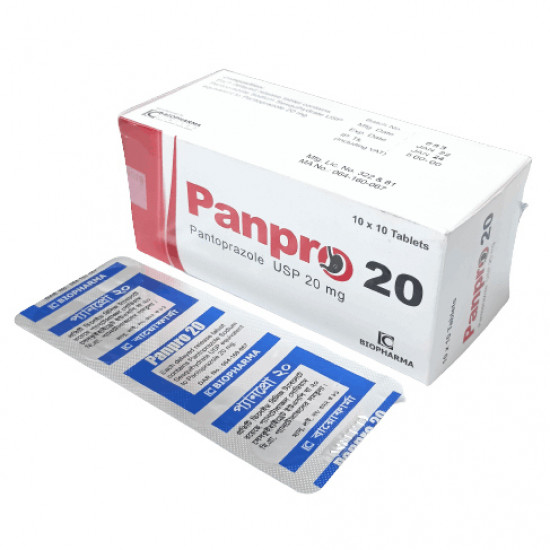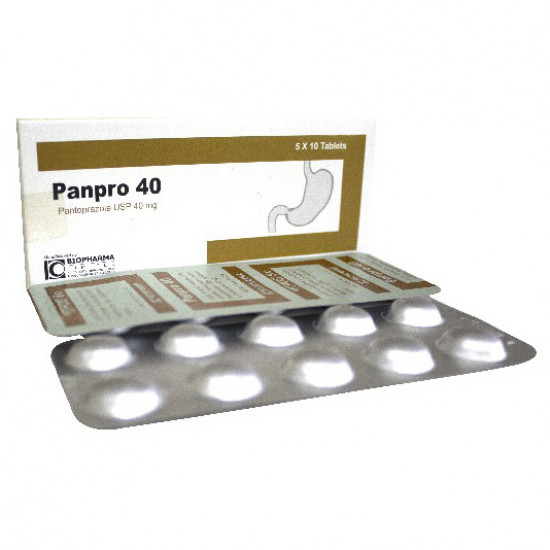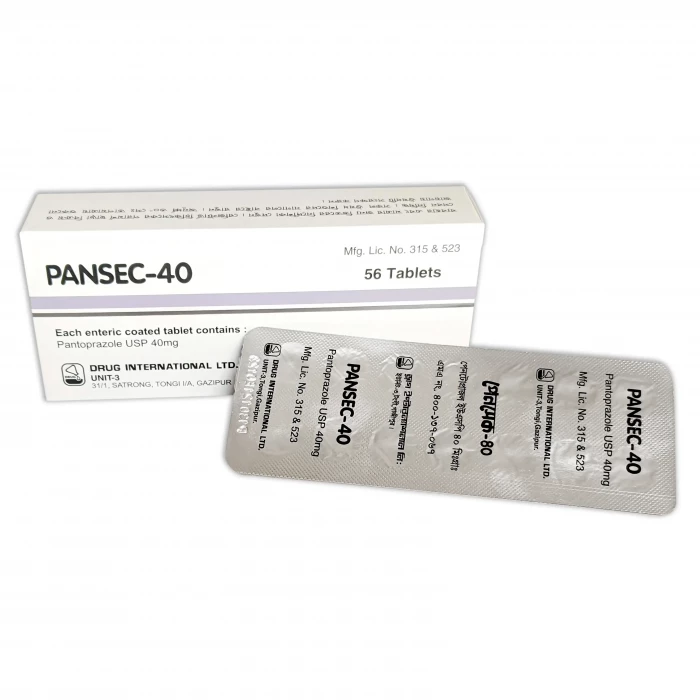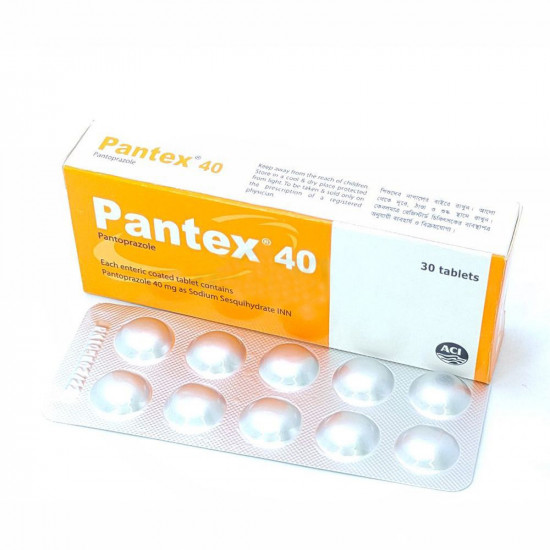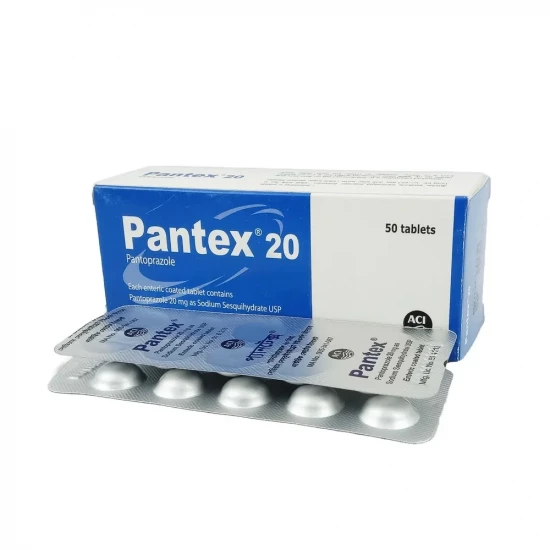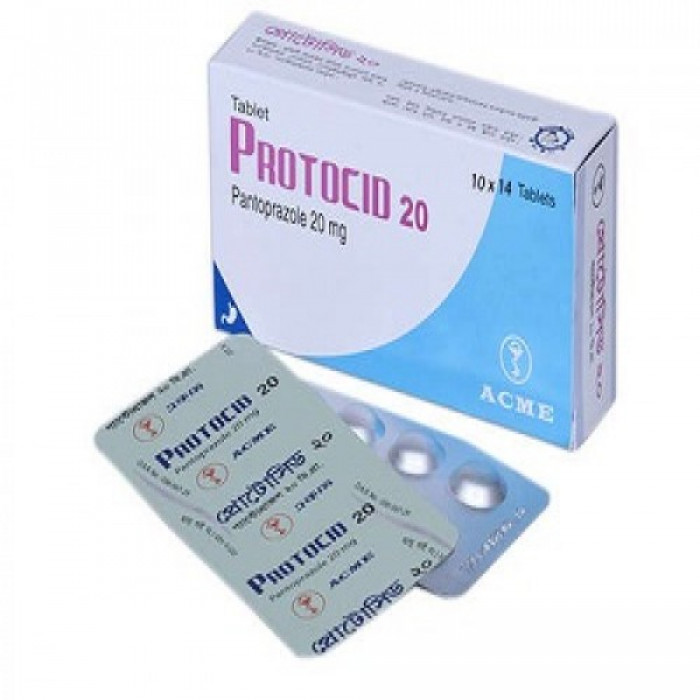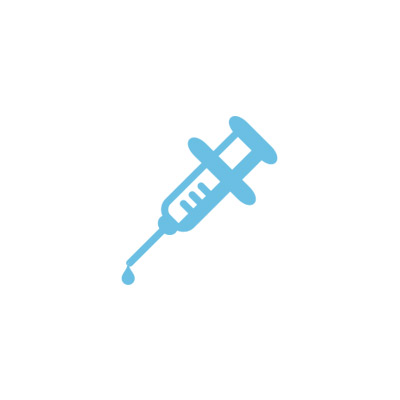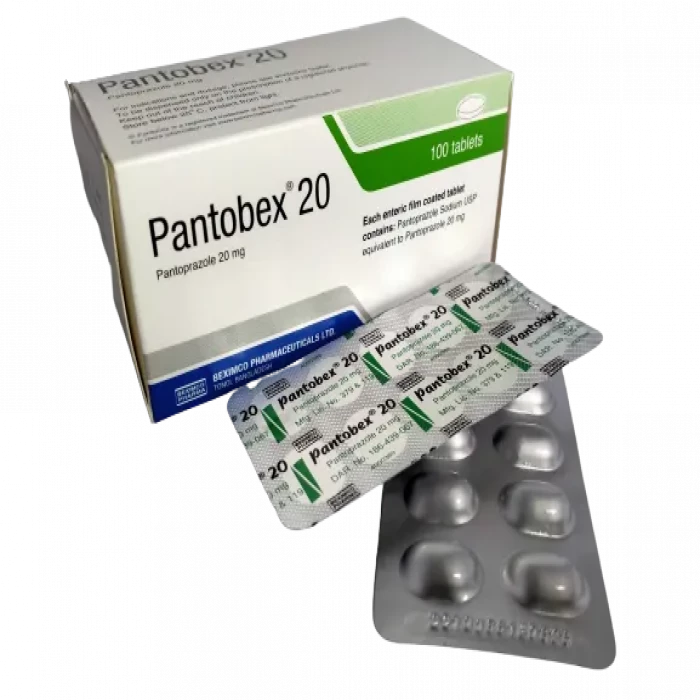
✔ 100% Authentic Product
👁️ Currently Viewing 7068
Pantobex 20mg Tablet
Pantoprazole is prescribed for the short-term treatment of erosive esophagitis associated with gastroesophageal diseases (GERD). It is also helpful in treating peptic ulcers, acid reflux and Zollinger-Ellison syndrome.
This proton-pump inhibitor reduces the amount of naturally occurring acid in the stomach. It helps by preventing oesophagus being damaged by the acids and treating peptic ulcers in the digestive system.
Pantoprazole also helps in the treatment of stomach ulcers caused by the bacteria called Helicobacter pylori. It is important that you stick to the dosage prescribed by the doctor to avoid any serious side effects. When taking the tablet, make sure that you do not miss a dose.
Discount
Price: ৳ 48
MRP:
৳
50
5%
Off

100% Genuine Products, Guaranteed

Safe & Secure Payments, Always

Fast, Secure & Efficient Delivery

Proper Packaging
 Cash on Delivery - All over Bangladesh
Cash on Delivery - All over Bangladesh Regular Delivery - 12-24 Hours, Dhaka City* Charge Tk.39-59
Regular Delivery - 12-24 Hours, Dhaka City* Charge Tk.39-59 Regular Delivery - 24-48 Hours, Other Cities* Charge Tk.99-110
Regular Delivery - 24-48 Hours, Other Cities* Charge Tk.99-110
 ফ্রি ডেলিভারিঃ - ৯৯৯ টাকা+ অর্ডারে, ঢাকা
শহরে
ফ্রি ডেলিভারিঃ - ৯৯৯ টাকা+ অর্ডারে, ঢাকা
শহরে ফ্রি ডেলিভারিঃ - ২৯৯৯ টাকা+ অর্ডারে, ঢাকার
বাহিরে
ফ্রি ডেলিভারিঃ - ২৯৯৯ টাকা+ অর্ডারে, ঢাকার
বাহিরে
100% Genuine Products, Guaranteed
Safe & Secure Payments, Always
Fast, Secure & Efficient Delivery
Proper Packaging
 Cash on Delivery - All over Bangladesh
Cash on Delivery - All over Bangladesh Regular Delivery - 12-24 Hours, Dhaka City* Charge Tk.39-59
Regular Delivery - 12-24 Hours, Dhaka City* Charge Tk.39-59 Regular Delivery - 24-48 Hours, Other Cities* Charge Tk.99-110
Regular Delivery - 24-48 Hours, Other Cities* Charge Tk.99-110 ফ্রি ডেলিভারিঃ - ৯৯৯ টাকা+ অর্ডারে, ঢাকা
শহরে
ফ্রি ডেলিভারিঃ - ৯৯৯ টাকা+ অর্ডারে, ঢাকা
শহরে ফ্রি ডেলিভারিঃ - ২৯৯৯ টাকা+ অর্ডারে, ঢাকার
বাহিরে
ফ্রি ডেলিভারিঃ - ২৯৯৯ টাকা+ অর্ডারে, ঢাকার
বাহিরে
✅ Description:
- Treatment of peptic ulcers (painful sores in the stomach, esophagus, or intestines)
- Management of gastroesophageal reflux disease (GERD) and associated symptoms like acidity, heartburn, acid reflux, and swallowing pain
- Treatment of reflux esophagitis (inflammation of the food pipe accompanied by acid reflux)
- Prevention of peptic ulcers caused by long-term use of non-steroidal anti-inflammatory drugs (NSAIDs)
- Take Pantobex 20mg Tablet at least 1 hour before meals for maximum benefits.
- The medication is suitable for use in adults and children aged 12 years or above weighing 35 kg or more.
- Your doctor will closely monitor your kidney functions, liver functions, and blood magnesium levels during treatment to prevent unwanted side effects.
- Inform your doctor if you have any liver, kidney, or heart problems.
- Let your doctor know if you have weak bones or a history of bleeding in the gut.
- Contact your doctor immediately if you experience severe tiredness with abnormal muscle movements, dizziness, confusion, disorientation, or irregular heartbeat, as these could be signs of low magnesium levels in the blood.
Safety Advices

Alcohol
UNSAFE
Alcohol causes acidity and worsens the symptoms of acidity and ulcer. Avoid consuming alcohol while taking the tablet.

Pregnancy
CONSULT YOUR DOCTOR
Pantobex 20mg Tablet is usually not recommended in pregnant women as there are no adequate data on human studies. Hence, consult your doctor before taking this medicine.

Breastfeeding
CONSULT YOUR DOCTOR
Pantobex 20mg Tablet may pass into breastmilk. An alternate medicine may be prescribed, especially while nursing your newborn or preterm infant. Consult your doctor if you are breastfeeding.

Driving
UNSAFE
You may feel dizzy or disturbed vision after taking this medicine. If you experience these symptoms, avoid driving or using machines.

Kidney
CAUTION
Patients with kidney disease should consult a doctor before taking Pantobex 20mg Tablet.

Liver
CAUTION
Pantobex 20mg Tablet should be taken with precaution in patients with liver disease.
✔️ Uses of Pantobex 20mg Tablet
- Stomach and intestinal ulcers
- Gastroesophageal Reflux Disease
- Erosive Esophagitis
- Zollinger-Ellison Syndrome
- Helicobacter pylori Infection
✔️ How does Pantobex 20mg Tablet work?
This is a proton pump inhibitor drug and binds to H+/K+-exchanging ATPase in gastric parietal cells, resulting in blockage of acid secretion.
✔️ Side Effects of Pantobex 20mg Tablet
Common side effects of this medicine include:
- Headache
- Nausea
- Vomiting
- Joint Pain
- Diarrhea
- Dizziness
- Skin Blistering
- Loss of appetite
- Muscle pain
- Presence of blood in stool
- Troubled breathing
- Dark or clay-colored stools
- Light Headedness
- Seizures
- Anxiety
- Chest Pain
✔️ Quick Suggestions:
- It is recommended to use this medicine in the prescribed manner. However, anti-reflux medicines should preferably be taken in the morning on an empty stomach or with food for optimum effectiveness.
- You can make certain lifestyle modifications like preventing excess intake of foods that cause acidity, like carbonated drinks and oily/fried food, regular exercise, and maintaining a healthy weight.
- It is also advised to limit alcohol intake and quit smoking for better treatment of your acidity.
- It is advised to reduce stress and get good sleep each night.
- Inform your doctor if you are using this medicine as a continuous treatment of acidity for more than 4 weeks or if the symptoms are persistent even after taking the medicine.
- This medicine can hamper the actions of other medicines taken at the same time. Inform your doctor if you are using any other medicines.
- Consult your doctor if you experience effects like nausea, fullness, and bloating, especially after food intake, even after taking this medicine.
✔️ Indication of Pantobex 20mg Tablet
Pantobex 20mg Tablet is an anti-ulcer medicine. It is used to treat various stomach and intestinal conditions that may occur due to excess production of acid.
✔️ Pharmacology
Pantoprazole is a proton pump inhibitor (PPI) that belongs to the class of substituted benzimidazoles. It works by blocking the final step of acid secretion in the stomach.
The acid secretion process in the gastric parietal cells involves the H+/K+ ATPase enzyme system. Pantoprazole specifically targets and inhibits this enzyme system, preventing the secretion of gastric acid into the stomach.
Pantoprazole is effective in inhibiting both basals (resting) and stimulated (in response to various stimuli such as food) acid secretion. By reducing the production of stomach acid, it helps in treating conditions like gastroesophageal reflux disease (GERD), peptic ulcers, and other acid-related disorders.
✔️ Dosage & Administration of Pantobex 20mg Tablet
Adult Dose:
- Erosive Esophagitis Associated with GERD Treatment:
- 40 mg orally once daily for 8-16 weeks. Maintenance of healing: 40 mg orally once daily.
- Short-term Treatment of GERD (oral therapy inappropriate or not possible):
- 40 mg IV infusion over 15 minutes once daily for 7-10 days; switch to oral once the patient is able to swallow.
- Zollinger-Ellison Syndrome: 40 mg orally once daily; up to 240 mg/day in some patients.
- Peptic Ulcer Disease: Dosage varies depending on the type of ulcer.
Child Dose:
- Erosive Esophagitis Associated with GERD:
- Safety and efficacy not established for children under 5 years.
- Children 5 years and older (15 kg to <40 kg): 20 mg orally once daily for up to 8 weeks.
- Children 40 kg or greater: 40 mg orally once daily for up to 8 weeks.
Controlled-Release Formulation:
- Take on an empty stomach, 1 hour before meals.
- Swallow the tablet whole, without chewing or crushing.
Normal Release Formulation:
- Can be taken with or without food.
Please note that this information is not a substitute for medical advice. It is important to follow your doctor's instructions regarding the correct dose and duration of therapy for your specific condition.
✔️ Interaction
Drug-Drug Interactions:
- Medicines used to treat fungal infections (ketoconazole, itraconazole, posaconazole)
- Erlotinib (used to treat cancer)
- Warfarin and phenprocoumon (blood thinners)
- Methotrexate (used to treat cancer and autoimmune diseases)
- Atazanavir (used to treat HIV infection)
- Fluvoxamine (used to treat depression)
- Rifampicin (used to treat tuberculosis)
- St. John's wort (herbal medicine for depression)
Interaction with Alcohol:
- The interaction with alcohol is unknown. Consult your doctor before consuming alcohol.
Interaction with Lab Test:
- No specific information is available.
Interaction with Disease:
- Pantoprazole may interact with osteoporosis, hypomagnesemia, and liver diseases, potentially causing serious side effects. Inform your doctor if you have any of these conditions before starting the medication.
Overdosage:
- In case of accidental overdose, consult your doctor immediately or visit the nearest hospital.
✔️ Contraindications
Pantobex 20 is contraindicated in patients who are known to be allergic to any ingredient in the preparation.
✔️ Pregnancy & Lactation
Pantobex 20 is classified as a Category B medication for pregnancy by the FDA. This classification indicates that there are no adequate and well-controlled studies in pregnant women, but animal studies have not shown any evidence of harm to the fetus. However, it is important to note that animal studies may not always accurately predict human response.
Considering the lack of extensive human data, Pantobex 20 should only be used during pregnancy if the potential benefits to the mother outweigh the potential risks to the fetus. The decision to use the medication should be made in consultation with a healthcare professional, taking into account the individual circumstances and available treatment alternatives.
Pantobex 20 has been shown to be excreted in human milk. Therefore, if a breastfeeding mother is taking Pantobex 20, it is necessary to consider the benefits of the medication for the mother and make a decision whether to continue breastfeeding or discontinue the drug. It is recommended to consult with a healthcare provider to discuss the potential risks and benefits in such situations.
✔️ Precautions & Warnings
- Allergy to Pantobex 20mg Tablet or proton pump inhibitors
- Gastric cancer
- Liver disease
- Low magnesium levels (osteoporosis)
- Low vitamin B12 levels
- Pregnancy or planning for pregnancy
- Breastfeeding mothers
Prolonged use of Pantobex 20mg Tablet may have the following risks:
- Lupus erythematosus (an inflammatory condition)
- Vitamin B12 deficiency
- Magnesium deficiency
Masking Symptoms of Gastric Cancer: Pantobex 20mg Tablet may mask the symptoms of gastric cancer. If you experience severe stomach pain or gastric bleeding (blood in mucous or stool), consult your doctor immediately.
Lifestyle and Dietary Recommendations:
- Raise the bedhead while sleeping to prevent stomach acid backflow.
- Avoid alcohol and cigarette smoking, as they can worsen heartburn and acid reflux.
- Include high-fiber foods, berries, cherries, leafy green vegetables, and black peppers in your diet.
- Consume fermented dairy products for probiotics and cranberry juice for peptic ulcers and H. pylori infection.
- Take regular breaks from sitting and engage in brisk walking or stretching.
Monitoring Parameters:
- Monitor magnesium levels prior to initiation and periodically during prolonged use.
- Regular monitoring of vitamin B12 levels may be required during long-term use.
Breastfeeding: Pantoprazole, the active ingredient in Pantobex 20mg Tablet, has been detected in breast milk, but there were no reported effects on breastfed infants. The benefits of breastfeeding should be considered along with the mother's clinical need for Pantobex 20mg Tablet.
Laboratory Test Interference: Pantobex 20mg Tablet may interfere with certain laboratory tests, potentially causing false results. It's important to inform laboratory personnel and all your doctors that you are using Pantobex 20mg Tablet.
✔️ Storage Conditions
Store in a cool and dry place, away from sunlight. Keep it out of the reach of children and pets.
⚠️Disclaimer:
At ePharma, we’re committed to providing accurate and accessible health information. However, all content is intended for informational purposes only and should not replace medical advice from a qualified physician. Please consult your healthcare provider for personalized guidance. We aim to support, not substitute, the doctor-patient relationship.




